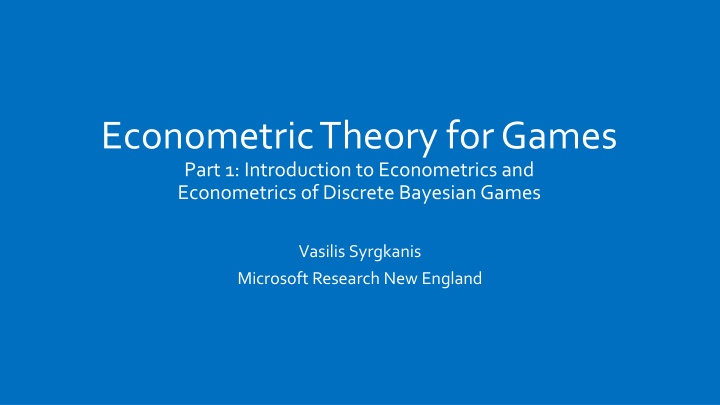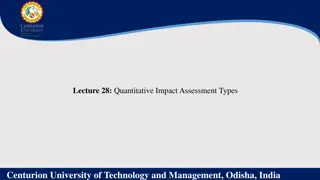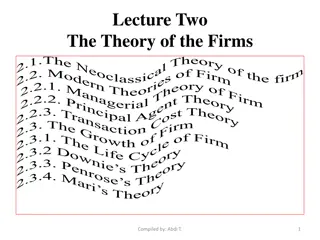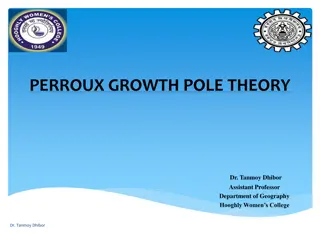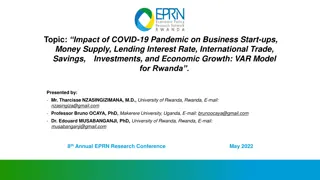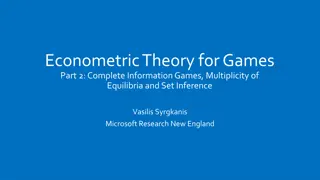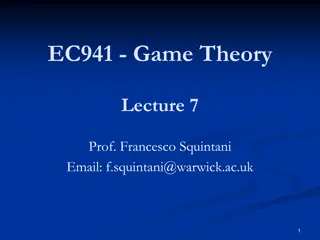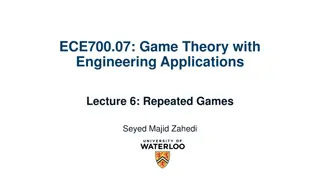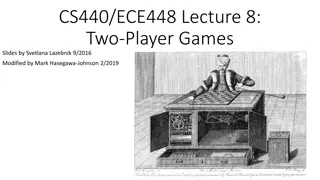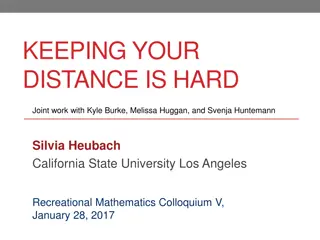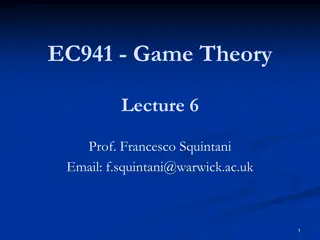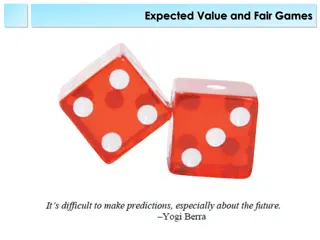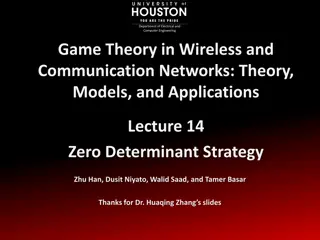Introduction to Econometric Theory for Games in Economic Analysis
This material delves into the fundamentals of econometric theory for games, focusing on estimation in static and dynamic games of incomplete information, as well as discrete static games of complete information, auction games, and algorithmic game theory. It covers basic tools, terminology, and main goals related to identification and estimation in econometrics, along with properties and classes of estimators such as finite sample properties and large sample properties. The tutorial also explores topics like the Generalized Method of Moments (GMM) for estimation.
Download Presentation

Please find below an Image/Link to download the presentation.
The content on the website is provided AS IS for your information and personal use only. It may not be sold, licensed, or shared on other websites without obtaining consent from the author.If you encounter any issues during the download, it is possible that the publisher has removed the file from their server.
You are allowed to download the files provided on this website for personal or commercial use, subject to the condition that they are used lawfully. All files are the property of their respective owners.
The content on the website is provided AS IS for your information and personal use only. It may not be sold, licensed, or shared on other websites without obtaining consent from the author.
E N D
Presentation Transcript
Econometric Theory for Games Part 1: Introduction to Econometrics and Econometrics of Discrete Bayesian Games Vasilis Syrgkanis Microsoft Research New England
Outline of tutorial Day 1: Brief Primer on Econometric Theory Estimation in Static Games of Incomplete Information: two stage estimators Markovian Dynamic Games of Incomplete Information Day 2: Discrete Static Games of Complete Information: multiplicity of equilibria and set inference Day 3: Auction games: Identification and estimation in first price auctions with independent private values Algorithmic game theory and econometrics Mechanism design for data science Econometrics for learning agents
A Primer on Econometric Theory Basic Tools and Terminology
Econometric Theory Given a sequence of i.i.d. data points ?1, ,?? Each ?? is the outcome of some structural model ?? ? ?0,with ?0 Parameter space can be: Finite dimensional (e.g. ??): parametric model Infinite dimensional (e.g. function): non-parametric model Mixture of finite and infinite: If we are interested only in parametric part: Semi-parametric If we are interested in both: Semi-nonparametric
Main Goals Identification: If we knew population distribution ?(?0) then can we pin-point ?0? Estimation: Devise an algorithm that outputs an estimate ?? of ?0 when having ? samples
Estimator Properties of Interest Finite Sample Properties of Estimators: Bias = ? ?? ?0= 0? Variance: Var( ??) ? Mean-Squared-Error (MSE): ? Large Sample Properties: ? Consistency: ?? ?0? Asymptotic Normality: ?? ?? ?0 ?(0,?) ? ?-consistency: ??= Efficiency: is limit variance ? information theoretically optimal? (typically achieved by MLE estimator) 2 ?? ?0 = Variance + Bias2 ? ?
General Classes of Estimators Generalized Method of Moments (GMM): suppose in population ?[? ?,? ] = 0. Then ?? is solution to: 1 ? ? ??, ?? = 0 ? Example. Linear regression: ? = ? ? + ?. Then: ? ? ? ? ? Empirical analogue: 1 ? ? Where ? = [?1 ??] (matrix with columns ?? vectors, i.e. (OLS estimate) = 0 ??=1 ?? ?? ??= ? ?? 1? ? ? ?? ?? ? ?
General Classes of Estimators Extremum Estimator: Suppose we know that ?0= argmin? ?0(?) ??= argmin? ??(?) Examples MLE: ??? = 1 ln?(??;?) Overidentified GMM Estimator: suppose in population ?[? ?,? ] = 0. Then: ?0= argmin? ? ? ?,? positive definite 1 ? ? ? ? ?=1 ?? ? ? ?,? , for some W ?= ? ? ?,? ? 1 ? ??? = ? ??,? ? ? ??,? ?
Consistency of Extremum Estimators Consistency Theorem. If there is a function ?0? s.t.: 1. ?0? is uniquely maximized at ?0 2. ?0? is continuous 3. ??? converges uniformly in probability to ?0? , i.e. sup ??? ?0? ?0 ? Then ? ??0 1 ? ?? ??,? and ?0? = ? ? ?,? , then (2.,3.) will be If ??? = satisfied if ? ?,? is continuous ? ?,? ?(?) with ? ? ? Typically referred to as regularity conditions
Asymptotic Normality Under regularity conditions asymptotic normality of extremum estimators follows by ULLN, CLT, Slutzky thm and consistency Roughly: consider case ??? = Take first order condition 1 ? ? Linearize around ?0 by mean value theorem 1 ? ? ? Re-arrange: 1 ? ? 1 ? ?? ??,? In practice, typically variance is computed via Bootstrap [Efron 79]: Re-sample from your samples with replacement and compute empirical variance ???(??, ?) = 0 1 ? ???? ??, ? ? ?0 = 0 ??? ??,?0 + 1 1 ? ? ?0 = ???? ??, ? ? ??? ??,?0 ?? 0,? ? ?? ???? ?,?0 ?? 0,??? ??? ?,?0
Econometric Theory for Games ?? are observable quantities from a game being played ?0: unobserved parameters of the game Address identification and estimation in a variety of game theoretic models assuming players are playing according to some equilibrium notion
Why useful? Scientific: economically meaningful quantities Perform counter-factual analysis: what would happen if we change the game? Performance measures: welfare, revenue Testing game-theoretic models: if theory on estimated quantities predicts different behavior, then in trouble
Incomplete Information Games and Two-Stage Estimators Static Games: [Bajari-Hong-Krainer-Nekipelov 12] Dynamic Games: [Bajari-Benkard-Levin 07], [Pakes-Ostrovsky- Berry 07], [Aguirregabiria-Mira 07], [Ackerberg-Benkard-Berry- Pakes 07], [Bajari-Hong-Chernozhukov-Nekipelov 09]
High level idea At equilibrium agents have beliefs about other players actions and best respond If econometrician observes the same information about opponents as the player does then: Estimate these beliefs from the data in first stage Use best-response inequalities to these estimated beliefs in the second stage and infer parameters of utility
Static Entry Game with Private Shocks Two firms deciding whether to enter a market Entry decision ?? {0,1} Profits from entry: ?1= ? ?1+ ?2?1+ ?1 ?2= ? ?2+ ?1?2+ ?2 ?? ??: at each market i.i.d. from known distribution and private to player ?: observable characteristics of each market ??,??: constants across markets
Static Entry Game with Private Shocks Firms best-respond only in expectation Expected profits from entry: 1= ? ?1+ Pr ?2= 1|? ?1+ ?1 2= ? ?2+ Pr[?1= 1|?] ?2+ ?2 Let ??? = Pr[??= 1|?] Then: ?1? = Pr[? ?1+ ?2? ?1+ ?1> 0] ?2? = Pr[? ?2+ ?1? ?2+ ?2> 0]
Static Entry Game with Private Shocks If ?? is distributed according to an extreme value distribution: ?1? exp[? ?1+ ?2? ?1] ?2? exp[? ?2+ ?1? ?2] Non-linear system of simultaneous equations Computing fixed point is computationally heavy and fixed-point might not be unique Idea [Hotz-Miller 93, Bajari-Benkard-Levin 07, Pakes-Ostrovsky-Berry 07, Aguirregabiria-Mira 07, Bajari-Hong-Chernozhukov-Nekipelov 09]: Use a two stage estimator 1. Compute non-parametric estimate ?(?) of function ??? from data 2. Run parametric regressions for each agent individually from the condition that: ??? exp[? ??+ ? ?? ??] 3. The latter is a simple logistic regression for each player to estimate ??,??
Simple case: finite discrete states If there are ? states, then ?? are ?-dimensional parameter vectors Easy ?-consistent first-stage estimators ? = ?1, ?2 of ? = (?1,?2), i.e.: ? ?? ? ?(0,?) Suppose for second stage we do generalized method of moment estimator: Let ? = ?1, ?2, ?1, ?2 and ?0= ?1,?2,?2,?2 Let ??= ?1?,?2? and ?,?,? = 1?,?,? , 2?,?,? with ??,?,? = Then second stage estimator ? is the solution to: 1 ? ?=1 Does first stage error affect second stage variance and how? This is a general question about two stage estimators ?? ??+? ?? 1+?? ??+? ?? ? ? ?? ?? ??, ?, ? = 0
Two-Stage GMM with ?-Consistent First Stage [Newey-McFadden 94: Large Sample Estimation and Hypothesis Testing] Run a first step estimator ? of ?, with ? ? ? ? 0,? Second stage is a GMM estimator based on moment conditions ? ? ?,?,? = 0, i.e. ? satisfies: ? 1 ? ?=1 ? ??, ?, ? = 0 Linearize around ?: 1 ? ? ?? ??, ?, ? ?? 1 ? ?=1 1 ? ? ? = ? ?=1 ? ??,?, ? Now the second term can be linearized around ?: 1 ? ?=1 ? ? 1 ?(??,?,?) +1 ?? ??,?, ? ?? ? ??,?, ? = ? ?=1 ? ?=1 ?( ? ?)
Continuous State Space and Semi- Parametric Efficiency
Continuous State Space: ? ?? [Bajari-Hong-Kranier-Nekipelov 12] Then there is no ?-consistent first stage non-parametric estimator ?( ) for function ? = ?[?|?] Remarkably: still ?-consistency for second stage estimate ?!! For instance: Kernel estimator for the first stage (tune bandwidth, undersmoothing ) GMM for second stage Intuition: Kernel estimators have tunable bias - variance tradeoffs Close to true ?: first stage bias and variance affect linearly second stage estimate If variance and bias decay at ? 1 Requires at least ? 1 Typically we have wiggle room to get variance of that order while decreasing bias to decay at ? 1 2 rates we are fine 4-consistency of first stage 2 rate (e.g. decrease the bandwidth of a kernel estimate)
Semi-Parametric Two-Stage Estimation [Newey-McFadden 94, Chernozhukov et al 16] = 0, i.e. ? satisfies: Second stage is a GMM estimator based on moment conditions ? ? ?,?,?(?) 1 ? ?=1 Linearize around ?: ? ?? ??, ?, ?(??) ? ? ??, ?, ?(??) = 0 1 ? Split data set to estimate ? with a separate dataset than the one used for ?. Makes ? independent of ?? 1 ? ?=1 1 ? ? ? = ? ?=1 ? ??,?, ? ?? ?? Second order expansion of second term around true ?: 1 ? ?=1 ?=1 ? ?2? ??,?, ? ?? ??2 1 ?? ??,?,? ?? ?? 1 2 ? ??,?,? ?? + ? ? ?? ? ?? + ? ?=1 ? ?? ? ??
Semi-Parametric Two-Stage Estimation [Newey-McFadden 94] Suffices to control: ? Bias ? and ? MSE ? Kernel estimators have tunable bias - variance tradeoffs For instance: if ? is a single dimensional density function and we use a Kernel estimator: ? 1 ? ?? ? ? = ? ? ?=1 1 1 Bias ? 2 MSE = Bias ?2+ Variance ? 4+ Variance ? ? ? Optimal bandwidth for MSE is ? 1 Undersmoothing, decay the bandwidth faster than optimal: ? 1 ? ? 4 5 MSE ? 4 5. But then ? ???? ? 3 ? ???? ? ? 1 For detailed exposition see: [Newey94, Ai-Chen 03] Section 8.3 of survey of [Newey-McFadden 94] Han Hong s Lecture notes on semi-parametric efficiency [ECO276 Stanford] 6 0 3+ ? 2 ? ??? ? 3 0
General Dynamic Games [Bajari-Benkard-Levin 07], [Pakes-Ostrovsky-Berry 07], [Aguirregabiria-Mira 07], [Ackerberg-Benkard-Berry-Pakes 07], [Bajari-Hong-Chernozhukov-Nekipelov 09]
Steady-State Markovian Dynamic Games ?? ??+1 1. 4. State probabilistically transitions to next state, based on prior state and on action profile Private shocks i.i.d., independent of state and private information to each player t ?1? ?1 ??? t ?n 2. 3. ?1??,??,??? = ?1??,?? + ????? Each player receives payoff ?= ????,??? Each player ? picks an action ?? based on current state and on private shock ????,??,??? = ????,?? + ????? Steady state policy: time-independent mapping from states, shocks to actions ???;?,? = ? ?=0 ????? ??,??,??,??? ? ?0= ?;? = ??? ?,?0,? + ??0?(?,?0) shockless discounted expected equilibrium payoff. Markov-Perfect-Equilibrium: player chooses action ?? if: ????,? + ???? ???? ,? + ??(?? )
Dynamic Games: First Stage [Bajari-Benkard-Levin 07] Let ????? : probability of playing action ?? conditional on state ? Suppose ?? are extreme value and ??0,? = 0, then log??(??|?) log??0 ? = ??(??,?) Non-parametrically estimate ????? Invert and get estimate ????,? = log ??(??|?) log ??0 ? We have a non-parametric first-stage estimate of the policy function: ???,?? = argmax ??(??,?) ??(??) ?? ?? Combine with non-parametric estimate of state transition probabilities Compute a non-parametric estimate of discounted payoff for each policy, state, parameter tuple: ??(?,?;?), by forward simulation
Dynamic Games: First Stage [Bajari-Benkard-Levin 07] If payoff is linear in parameters: ???,?,??;? = i?,?,?? ? Then: ???,?;? = ???,? ? Suffices to do only simulation for each (policy, state) pair and not for each parameter, to get first stage estimates ??(?,?)
Dynamic Games: Second Stage [Bajari-Benkard-Levin 07] We know by equilibrium: ;? = ???,?;? ???? ,? ?;? 0 ? ?,?,?? Can use an extremum estimator: Definite a probability distribution over (player, state, deviation) triplets Compute expected gain from [deviation]- under the latter distribution ? ? = ?[min{? ?,?,?? By Equilibrium ? ?0 = 0 = min ? Do empirical analogue with estimate ?: ? ?,?,?? coming from first stage estimates Two sources of error: Error of ? and P ? ?,? : ?-consistent, asymptotically normal, for discrete actions/states Simulation error: can be made arbitrarily small by taking as many sample paths as you want ;? ,0}] ? ? ;? = ?? ?,?;? ???? , ? ?;?
Recap of main idea At equilibrium agents have beliefs about other players actions and best respond If econometrician observes the same information about opponents as the player does then: Estimate these beliefs from the data in first stage Use best-response inequalities to these estimated beliefs in the second stage and infer parameters of utility
References Primer on Econometric Theory Bajari-Chernozhukov-Hong-Nekipelov, 2009: Non-parametric and semi- parametric analysis of a dynamic game model Newey-McFadden, 1994: Large sample estimation and hypothesis testing, Chapter 36, Handbook of Econometrics Hotz-Miller, 1993: Conditional choice probabilities and the estimation of dynamic models, Review of Economic Studies Amemiya, 1985: Advanced Econometrics, Harvard University Press Static Games of Incomplete Information Hong, 2012: Stanford University, Dept. of Economics, course ECO276, Limited Dependent Variables Bajari-Hong-Krainer-Nekipelov, 2006: Estimating static models of strategic interactions, Journal of Business and Economic Statistics Surveys on Econometric Theory for Games Semi-Parametric two-stage estimation ?-consistency Ackerberg-Benkard-Berry-Pakes , 2006: Econometric tools for analyzing market outcomes, Handbook of Econometrics Hong, 2012: ECO276, Lecture 5: Basic asymptotic for ? Consistent semiparametric estimation Bajari-Hong-Nekipelov, 2010: Game theory and econometrics: a survey of some recent research, NBER 2010 Robinson, 1988: Root-n-consistent semiparametric regression, Econometrica Berry-Tamer, 2006: Identification in models of oligopoly entry, Advances in Economics and Econometrics Newey, 1990: Semiparametric efficiency bounds, Journal of Applied Econometrics Dynamic Games of Incomplete Information Newey, 1994: The asymptotic variance of semiparametric estimators, Econometrica Bajari-Benkard-Levin, 2007: Estimating dynamic models of imperfect competition, Econometrica Ai-Chen, 2003: Efficient estimation of models with conditional moment restrictions containing unknown functions, Econometrica Aguirregabiria-Mira, 2007: Sequential estimation of dynamic discrete games, Econometrica Chen, 2008: Large sample sieve estimation of semi-nonparametric models Chapter 76, Handbook of Econometrics Pakes-Ostrovsky-Berry, 2007: Simple estimators for the parameters of discrete dynamic games (with entry/exit examples), RAND Journal of Economics Chernozhukov, Chetverikov, Demirer, Duflo, Hansen, Newey 2016: Double Machine Learning for Treatment and Causal Parameters Pesendorfer-Schmidt-Dengler, 2003: Identification and estimation of dynamic games
